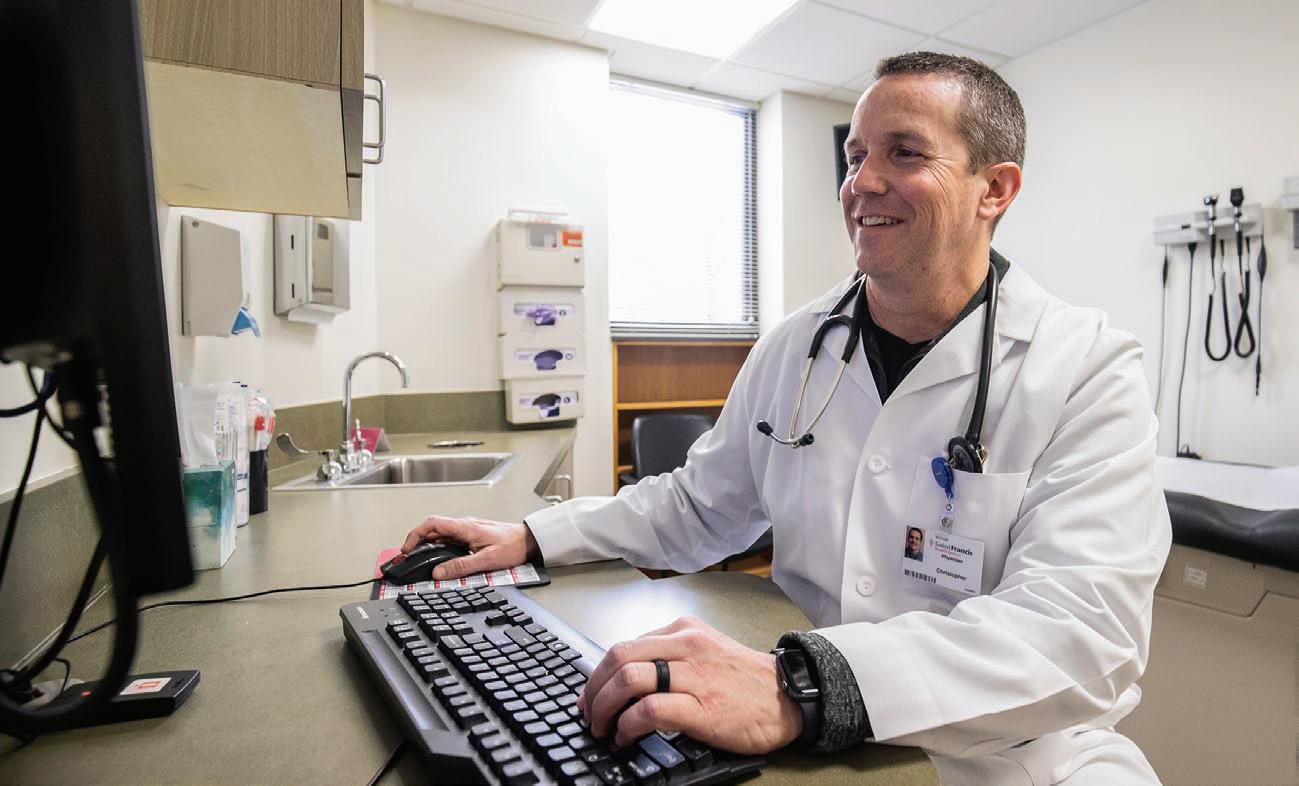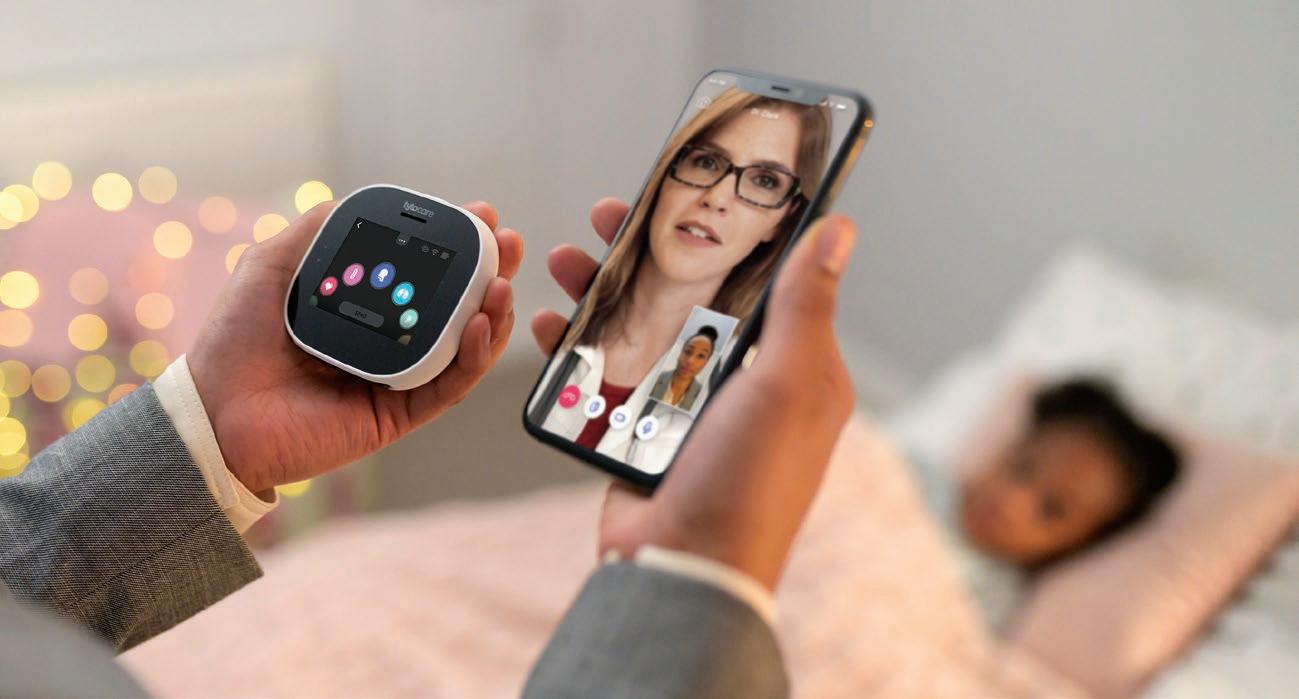
6 minute read
Warren Clinic Primary Care
Establishing a relationship with your primary care physician is vitally important for your lifelong health and well-being. Yet far too many patients simply do not do it.
“Some people think it’s unnecessary until something goes wrong,” said Dr. Kathuria. “We don’t want something bad to happen. That’s why you see the doctor.”
Avoiding primary healthcare services is not just a problem in Oklahoma; it’s a nationwide epidemic and is especially prevalent among men. According to a survey by the American Academy of Family Physicians, men are three times less likely to have seen a doctor in the past 12 months than women, while a 2019 Cleveland Clinic study found that only 50 percent of men ages 18-years or older feel getting a check-up is important. While women are more likely to visit the doctor than men, 45 percent of the women surveyed in a study by the Journal of the American College of Cardiology admitted to canceling or postponing appointments for reasons that included wanting to lose weight first.
“It is imperative to have a primary care physician because we are your medical home,” said Dr. Kathuria.
“You’re not going to know anything is wrong if you don’t get checked,” said Dr. Hardy. “I would love to see my patients on an annual basis just to see and talk to them, know their medical hopes and dreams, know how they’re doing emotionally, just making sure we’re doing everything right for them.”
“It’s incredibly important to see your doctor, especially the older you get,” said Dr. Hardy. “If you don’t have a primary care physician, if you don’t have a record on file, nobody is going to know your medical history, and how that translates into the care you want to receive.”
If you’re a parent of a younger child or teenager, establishing a baseline of health is just as important for your child’s pediatrician.

Bradley D. Hardy, DO
“There’s nuance and guidelines for children that may not be relevant for adults and vice-versa,” said Dr. Rock. “My experience as a pediatrician helps me minimize unnecessary treatments and focus on appropriate testing.” Dr. Rock also says consistency is key. “Sometimes I’ll see kids a couple of years after they’re sick, and if I had seen them earlier, we could have handled the issue, but now it requires surgery.”
Pretty much every primary care physician has a story about critical problems that a patient could have been ameliorated or even avoided simply by scheduling regular checkups.
“We've found cancers early, and the vast majority of those patients end up with good outcomes,” said Dr. Kathuria. “But there are cases that break my heart and make me wish they came in earlier. We see a lot of sad outcomes that would have been preventable if the patient came in. We want every person to achieve the best health and the best health outcomes that we can.”
Primary Care: The best investment of your life.
Being eastern Oklahoma’s largest, locally governed and operated health system gives Saint Francis and Warren Clinic unique insight into the needs of the community.
“Just like I need to put a hand on a patient to take their pulse, the local leadership feels the pulse of the community,” said Dr. Kathuria. “That’s how we can determine the needs and seek solutions.”
Beyond a shared commitment to serving the community, everyone at Saint Francis is driven to help each patient get the most out of life—during every stage of life. This mission starts with primary care.
“Life’s too short to have a poor quality of life,” said Dr. Hardy. “We’re here to be your advocate.”
“If something is wrong and my patients don’t know what to do, I am there for them,” said Dr. Kathuria. “To tell them: ‘This is your medical home and we’ll hold your hand. With God’s grace, we’ll get you to the best path.’”
Chris Abshere, MD

provided by
local physicians
Saint Francis is helping patients access healthcare services and achieve better health outcomes by leveraging emerging technologies that expand access to primary care like never before.
The nostalgic image of the family physician going on house calls is making a comeback. However, the leather medical satchel filled with stethoscopes and otoscopes is being replaced by a more state-of-the-art toolkit.
“Since the start of the pandemic, our job was to explore and adopt solutions to address the new challenges faced by our patients,” said Trey Bomier, director of the Saint Francis Institute of Emerging Technologies. “This solution included virtual visits, which have increased dramatically in the past year.” “Virtual care was originally something that was two to three years on the horizon,” said Chris Abshere, MD. “Then COVID-19 comes along and forces your hand, because you need to take care of people, but we have been limited on face-to-face contact.”
“Saint Francis’ pre-COVID investments paid off. We’ve done more than 100,000 video visits with over 60,000 patients across the system in under a year,” said Bomier.

The latest addition to services available for patients is Warren Clinic 24/7 Virtual Urgent Care which launched in December 2020. These video visits allow patients to receive on-demand care from a Saint Francis provider from wherever they are in the state of Oklahoma. “Before, patients had to make tough choices like missing work or going to the ER. This helps remove barriers for patients to get the care they need, when they need it.”
“This is a local service,” said Bomier. “We connect you to a Saint Francis provider who can reference your electronic medical record through our system. This is as much like going to visit the doctor as possible.”
Next up, the Saint Francis Care Kit, a supplement to Warren Clinic video visits, is being piloted with Saint Francis employees now. Bomier says these kits will be available to patients later this year. This groundbreaking technology is an all-inone device that attaches to a smartphone, and includes a thermometer, stethoscope and otoscope. With a Saint Francis Care Kit, your doctor can listen to your heart and lungs, utilize camera images look into your mouth and ears and take your vital signs, all while you are comfortably at home or in your office.
“You can even record things, which adds a whole new dimension to what you can look at and document,” said Dr. Abshere. “For me it’s almost easier to deliver the personalized care because we’re actually in their home. You really get more of a sense of who the patient is, where they live and what their situation is.”
“Think of it as an at-home, self-care kit,” said Bomier. “One Saint Francis Care Kit can be used for an entire family.”
“There’s still that art of medicine that comes with seeing patients in the office, and the communication that goes with that,” said Dr. Abshere. “Technology has opened up so many opportunities for healthcare that did not exist before, but the doctor-patient relationship still comes down to empathy, compassion and trust.”




